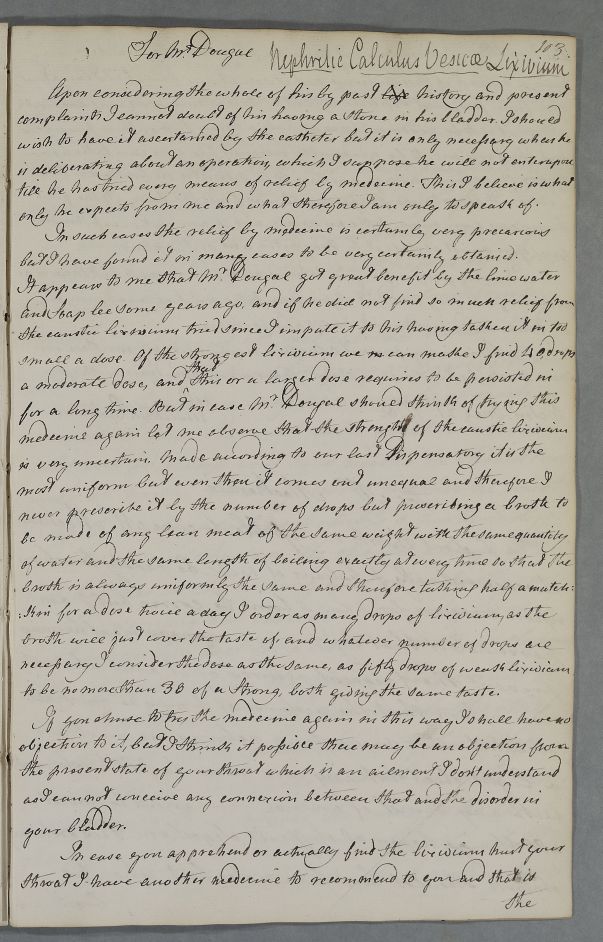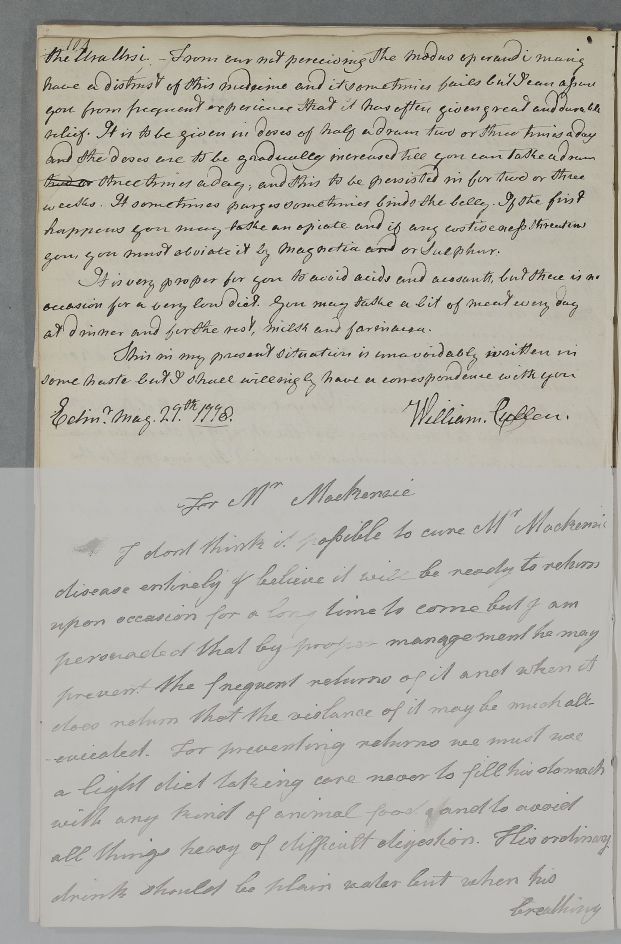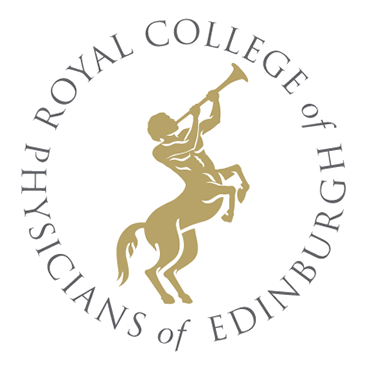
The Consultation Letters of Dr William Cullen (1710-1790) at the Royal College of Physicians of Edinburgh
[ID:4246] From: Dr William Cullen (Professor Cullen) / To: Mr Alexander Dougall (Dougal) / Regarding: Mr Alexander Dougall (Dougal) (Patient) / 29 May 1778 / (Outgoing)
Reply'For Mr Dougal'
- Facsimile
- Normalized Text
- Diplomatic Text
- Metadata
- Case
- People
- Places
Facsimile
There are 2 images for this document.

[Page 1]

[Page 2]
Metadata
| Field | Data |
|---|---|
| DOC ID | 4246 |
| RCPE Catalogue Number | CUL/1/1/10/103 |
| Main Language | English |
| Document Direction | Outgoing |
| Date | 29 May 1778 |
| Annotation | None |
| Type | Scribal copy ( includes Casebook Entry) |
| Enclosure(s) | No enclosure(s) |
| Autopsy | No |
| Recipe | No |
| Regimen | No |
| Letter of Introduction | No |
| Case Note | No |
| Summary | Reply'For Mr Dougal' |
| Manuscript Incomplete? | No |
| Evidence of Commercial Posting | No |
Case
Cases that this document belongs to:
| Case ID | Description | Num Docs |
|---|---|---|
| [Case ID:1033] |
Case of Alexander Dougall, a surgeon, with a history of gout and kidney stones but who now has a very painful bladder condition which is suspected of being a stone. |
2 |
People linked to this document
| Person ID | Role in document | Person |
|---|---|---|
| [PERS ID:1] | Author | Dr William Cullen (Professor Cullen) |
| [PERS ID:2264] | Addressee | Mr Alexander Dougall (Dougal) |
| [PERS ID:2264] | Patient | Mr Alexander Dougall (Dougal) |
| [PERS ID:1] | Patient's Physician / Surgeon / Apothecary | Dr William Cullen (Professor Cullen) |
Places linked to this document
| Role in document | Specific Place | Settlements / Areas | Region | Country | Global Region | Confidence |
|---|---|---|---|---|---|---|
| Place of Writing | Cullen's House / Mint Close | Edinburgh | Edinburgh and East | Scotland | Europe | certain |
Normalized Text
For Mr Dougal
Upon considering the whole of his by past life history and present
complaints I cannot doubt of his having a stone in his bladder. I should
wish to have it ascertained by the catheter but it is only necessary when he
is deliberating about an operation, which I suppose he will not enter upon
till he has tried every means of relief by medicine. This I believe is what
only he expects from me and what therefore I am only to speak of.
In such cases the relief by medicine is certainly very precarious
but I have found it in many cases to be very certainly obtained.
It appears to me that Mr Dougal got great benefit by the lime water
and Soap lee 1 some years ago, and if he did not find so much relief from
the caustic lixivium tried since I impute it to his having taken it in too
small a dose. Of the strongest lixivium we m can maske I find 40 drops
a moderate dose, and ↑that↑ this or a larger dose requires to be persisted in
for a long time. But in case Mr Dougal should think of trying this
medicine again let me observe that the strength of the caustic lixivium
is very uncertain. Made according to our last Dispensatory 2 it is the
most uniform but even then it comes out unequal and therefore I
never prescribe it by the number of drops but prescribing a broth to
be made of any lean meat of the same weight with the same quantity
of water and the same length of boiling exactly at every time so that the
broth is always uniformly the same and therefore taking half a mutch¬
kin for a dose twice a day I order as many drops of lixivium as the
broth will just cover the taste of, and whatever number of drops are
necessary I consider the dose as the same, as fifty drops of weak lixivium
to be no more than 30 of a strong, both giving the same taste.
If you chuse to try the medecine again in this way I shall have no
objection to it, but I think it possible there may be an objection from
the present state of your throat which is an ailment I don't understand
as I cannot conceive any connection between that and the disorder in
your bladder.
In case you apprehend or actually find the lixivium hurt your
throat I have another medecine to recommend to you and that is
[Page 2]
the Uva Ursi. From our not perceiving the modus operandi many
have a distrust of this medecine and it sometimes fails but I can assure
you from frequent experience that is has often given great and durable
relief. It is to be given in doses of half a dram two or three times a day
and the doses are to be gradually increased till you can take a dram
two orthree times a day; and this is to be persisted in for two or three
weeks. It sometimes purges sometimes binds the belly. If the first
happens you may take an opiate amd if any costiveness threatens
you, you must obviate it by Magnetia and or Sulphur.
It is very proper for you to avoid acids and acescents, but there is no
occasion for a very low diet. You may take a bit of meat every day
at dinner and for the rest, milk and farinacea.
This in my present situation is unavoidably written in
some haste but I shall willingly have a correspondence with you.
Diplomatic Text
For Mr Dougal
Upon considering the whole of his by past life history and present
complaints I cannot doubt of his having a stone in his bladder. I should
wish to have it ascertained by the catheter but it is only necessary when he
is deliberating about an operation, which I suppose he will not enter upon
till he has tried every means of relief by medicine. This I believe is what
only he expects from me and what therefore I am only to speak of.
In such cases the relief by medicine is certainly very precarious
but I have found it in many cases to be very certainly obtained.
It appears to me that Mr Dougal got great benefit by the lime water
and Soap lee 1 some years ago, and if he did not find so much relief from
the caustic lixivium tried since I impute it to his having taken it in too
small a dose. Of the strongest lixivium we m can maske I find 40 drops
a moderate dose, and ↑that↑ this or a larger dose requires to be persisted in
for a long time. But in case Mr Dougal should think of trying this
medicine again let me observe that the strength of the caustic lixivium
is very uncertain. Made according to our last Dispensatory 2 it is the
most uniform but even then it comes out unequal and therefore I
never prescribe it by the number of drops but prescribing a broth to
be made of any lean meat of the same weight with the same quantity
of water and the same length of boiling exactly at every time so that the
broth is always uniformly the same and therefore taking half a mutch¬
kin for a dose twice a day I order as many drops of lixivium as the
broth will just cover the taste of, and whatever number of drops are
necessary I consider the dose as the same, as fifty drops of weak lixivium
to be no more than 30 of a strong, both giving the same taste.
If you chuse to try the medecine again in this way I shall have no
objection to it, but I think it possible there may be an objection from
the present state of your throat which is an ailment I don't understand
as I cannot conceive any connection between that and the disorder in
your bladder.
In case you apprehend or actually find the lixivium hurt your
throat I have another medecine to recommend to you and that is
[Page 2]
the Uva Ursi. From our not perceiving the modus operandi many
have a distrust of this medecine and it sometimes fails but I can assure
you from frequent experience that is has often given great and durable
relief. It is to be given in doses of half a dram two or three times a day
and the doses are to be gradually increased till you can take a dram
two orthree times a day; and this is to be persisted in for two or three
weeks. It sometimes purges sometimes binds the belly. If the first
happens you may take an opiate amd if any costiveness threatens
you, you must obviate it by Magnetia and or Sulphur.
It is very proper for you to avoid acids and acescents, but there is no
occasion for a very low diet. You may take a bit of meat every day
at dinner and for the rest, milk and farinacea.
This in my present situation is unavoidably written in
some haste but I shall willingly have a correspondence with you.
XML
XML file not yet available.
Feedback
Send us specfic feeback about this document [DOC ID:4246]
Please note that the Cullen Project team have now disbanded but your comments will be logged in our system and we will look at them one day...


